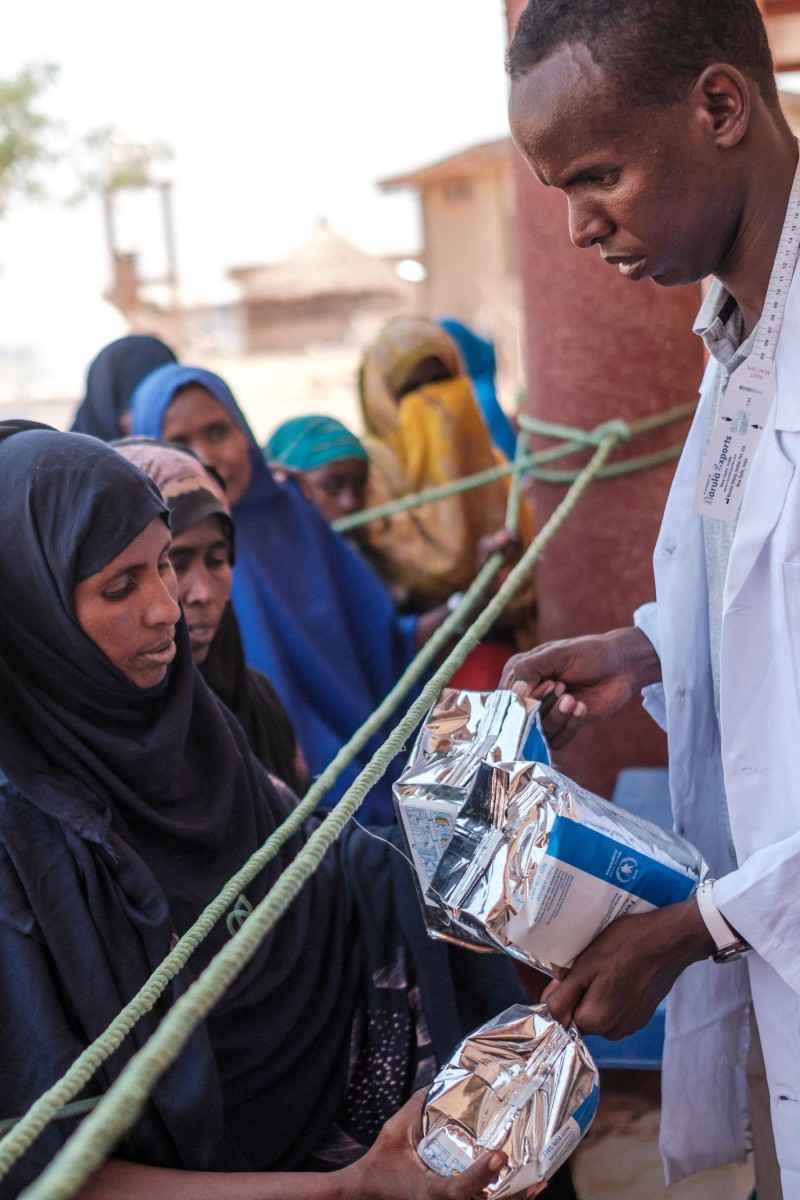
- New report says that 40 million more people were pushed into serious food insecurity in the last year due to conflict, climate change and economic crises
- The most affected countries include the Democratic Republic of Congo, Ethiopia, Yemen and Afghanistan; Russia’s war in Ukraine could also cause famine
 A health worker delivers nutrition packs to internally displaced women during a food distribution organised by the World Food Program in the village of Adlale, near the city of Gode, Ethiopia, on April 06, 2022. The worst drought to hit the Horn of Africa for 40 years is pushing 20 million people towards starvation, according to the UN. Photo: AFP
A health worker delivers nutrition packs to internally displaced women during a food distribution organised by the World Food Program in the village of Adlale, near the city of Gode, Ethiopia, on April 06, 2022. The worst drought to hit the Horn of Africa for 40 years is pushing 20 million people towards starvation, according to the UN. Photo: AFPThe number of people facing hunger rose to 193 million last year as conflict, climate change and economic crises ravaged people’s livelihoods, the United Nation’s Food and Agriculture Organisation (FAO) said on Wednesday.
While experts have warned that Russia’s war in Ukraine could cause famine, the FAO said in an annual report that nearly 40 million more people were pushed into “acute food insecurity” in 2021.
Among 53 countries facing the problem, the most affected include the Democratic Republic of Congo, Ethiopia, Yemen and Afghanistan where millions face hunger after the country plunged into financial crisis following the Taliban takeover in 2021.
Refugee teen from Ethiopia’s war-torn Tigray region recounts 16-month odyssey
The UN defines “acute food insecurity” as when a person’s inability to consume adequate food puts their lives or livelihoods in immediate danger.
“This is hunger that threatens to slide into famine and cause widespread death,” the FAO said.
The number has risen constantly since the first report was published by the FAO, the World Food Programme and the European Union in 2016.
The increase in 2021 has been “driven by a toxic triple combination of conflict, weather extremes and economic shocks”, with people affected in 53 countries, the FAO said.
Although the report does not take into account the conflict in Ukraine, the FAO said the war “stands to have the most devastating impacts on food crisis countries and those on the brink of famine”.
Russia and Ukraine are major exporters of essential agricultural products, ranging from wheat and sunflower oil to fertiliser, and the FAO has previously said the conflict sent world food prices to an all-time high in March.
UN officials say women and children in Ukraine need more protection
“The war has already highlighted the interconnected nature and fragility of global food systems,” the FAO said.
The agency noted that several countries battling major food crises obtained almost all of their wheat imports from Russia and Ukraine last year, including Somalia, the Democratic Republic of Congo and Madagascar.
The FAO warned that the “outlook moving forward is not good”.
Unsustainable agriculture has sped up global warming, warns UN expert
“Today, if more is not done to support rural communities, the scale of the devastation in terms of hunger and lost livelihoods will be appalling,” the report said.
“Urgent humanitarian action is needed on a massive scale to prevent that from happening,” it said.
In 2021, conflict and insecurity was the main driver of acute hunger in 24 countries, affecting 139 million people.
Economic “shocks”, worsened by the impact of coronavirus, hit 30.2 million people in 21 countries.
Extreme weather was the main driver of acute food insecurity for 23.5 million people in eight African countries.
The FAO said it needs US$1.5 billion to stabilise and increase local food production in at-risk regions where planting season is starting.
“There is no time to waste,” it said.